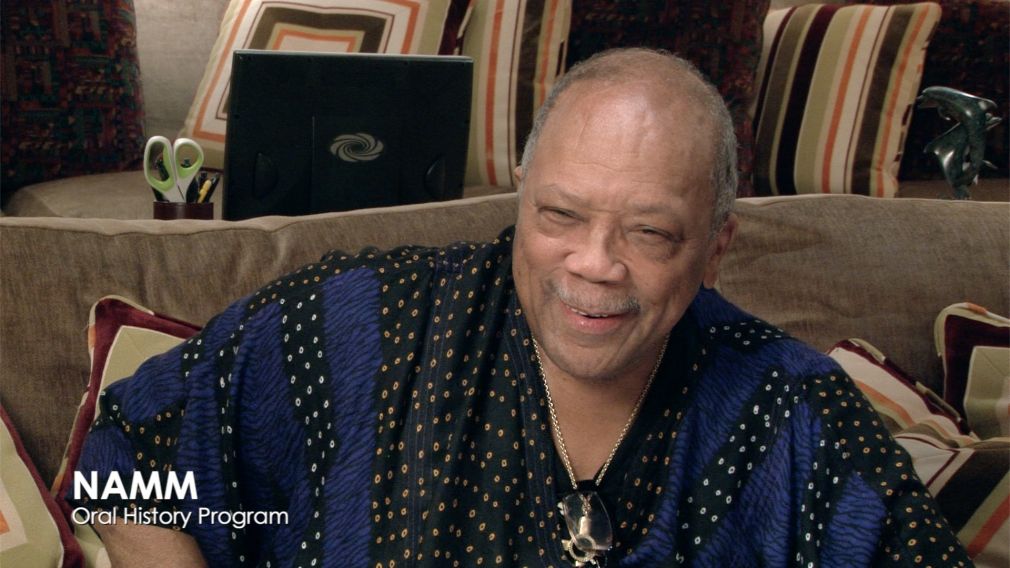Oral History Spotlight: Quincy Jones

Quincy Jones is the record producer, multi-instrumentalist, songwriter, composer, arranger, and film and television producer that brought the world iconic works like Thriller, The Color Purple, and the ground-breaking song, “We Are the World.” NAMM’s Oral History collection is proud to preserve two separate interviews with Jones within its collection.
The Jones family moved to Chicago as part of the Great Migration, where Jones was born in 1933. Jones was introduced to music by his mother and the family’s neighbor, Lucy Jackson. By age five, he often listened to Jackson playing stride piano through the walls of their home. After a shift in the family dynamic, In 1943, Jones relocated with his family to Bremerton, Washington, where his father held a wartime job at the Puget Sound Naval Shipyard. After World War II, the family relocated to Seattle, and Jones developed skills as a trumpeter and arranger while attending Garfield High School. It was there that Jones linked up with Charles Taylor, who played saxophone. By age 14, the duo played with a National Reserve band, and later that year, Jones introduced himself to a 16-year-old Ray Charles after watching Charles perform at the Black Elks Club. Jones credits Charles for his early musical inspiration, admiring Charles’s ability to overcome a disability and achieve his musical goals.
After completing high school, Jones attended Seattle University on scholarship, and after one semester, he transferred to the Berklee College of Music in Boston, also on a scholarship. Jones decided to abandon his studies to tour as a trumpeter, arranger, and pianist with bandleader Lionel Hampton. After the tour with Hampton, Jones moved to New York City and became a successful freelancer, arranging for Sarah Vaughan, Dinah Washington, Count Basie, Duke Ellington, Gene Krupa, and close friend Ray Charles. In 1956, Jones accepted a temporary job at the CBS stage show hosted by Jimmy and Tommy Dorsey as part of the studio band. It was there that Jones played second trumpet to support Elvis Presley’s first television performance.
Shortly after his work with CBS, Jones toured as a trumpeter and musical director for Dizzy Gillespie and then signed a contract with ABC-Paramount to begin his recording career. In 1957, Jones settled in Paris, France, studying music theory and composition, and became the music director at the French record company, Barclay, the licensee for Mercury in France. Jones was promoted to the vice president of Mercury five years later and composed the music for The Pawnbroker, the first of his nearly 40 major-motion picture scores.
After achieving success with The Pawnbroker, Jones left Mercury and moved to Los Angeles. He continued to churn out hits for film and expanded into television themes, composing iconic TV show themes for Sanford and Son and The Bill Cosby Show. Well established by the 1960s, Jones worked as an arranger for Billy Eckstine, Ella Fitzgerald, Shirley Horn, Peggy Lee, Frank Sinatra, Sarah Vaughn, and Dinah Washington. Jones continued success his success as a producer working on projects including:
Lesley Gore Singles- “It’s My Party,” “Judy’s Turn to Cry,” “She’s a Fool,” and “You Don’t Own Me.”
The soundtrack for The Wiz
Michael Jackson’s Off The Wall, Thriller, and Bad.
“We Are the World” charity single
Little Richard’s The King of the Gospel Singers
Other noteworthy achievements and awards include:
Produced the film, The Color Purple
Produced The Fresh Prince of Bel-Air and MADtv
Hosted Saturday Night Live
Convinced Miles Davis to make his final performance at the Montreux Jazz Festival.
Published Q: The Autobiography of Quincy Jones
Formed, Qwest TV the first subscription video-on-demand service for jazz and eclectic music.
Co-founded Playground Sessions, a software that teaches people how to play piano using interactive videos.
Horary doctorate from the Berklee College of Music and the Royal Academy of Music
Eighty GRAMMY® nominations and 28 awards, including a GRAMMY® Legend Award
National Medal of the Arts awarded by President Barack Obama
NAMM Music for Life Award
Jones is to be honored by Nashville’s National Museum of African American Music with the museum’s Rhapsody & Rhythm Award on June 17.
Jones has also been highly involved with social activism throughout his life, beginning in the 1960s with his support for Martin Luther King Jr., and Jones has advocated for the addition of a U.S. Secretary of Culture cabinet position for well over twenty years. Jones is a founder of the Institute for Black American Music, which aims to raise funds for a national library of African American art and music and the Black Arts Festival in Chicago. In 2009, The NAMM Foundation sponsored the first “Quincy Jones Musiq Consortium,” an event that brought together leaders from higher education, the nonprofit sector, and the music industry to explore ideas and strategies for expanding access to music education for children.
For Jones’ full interview, please visit /library/oral-history/quincy-jones.